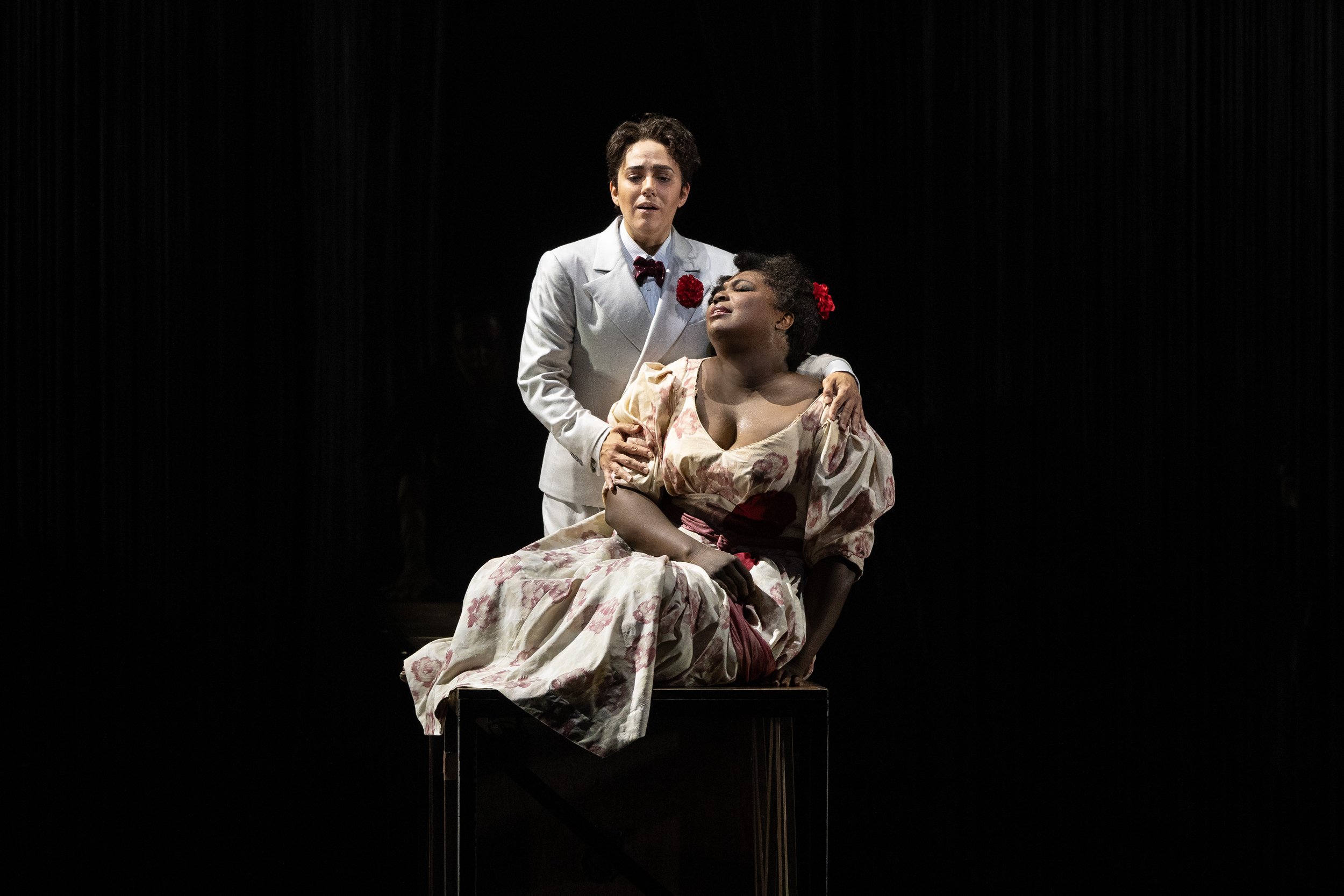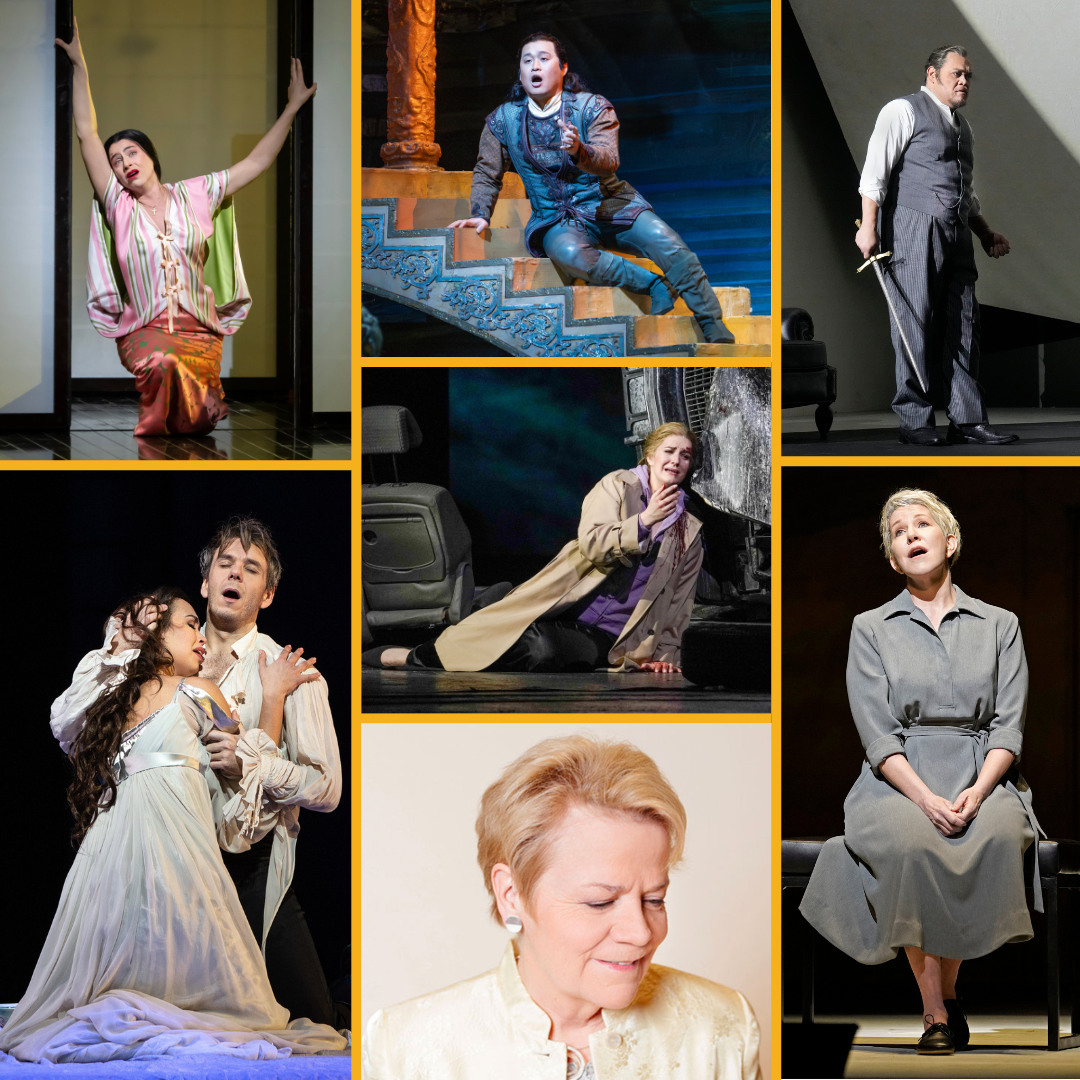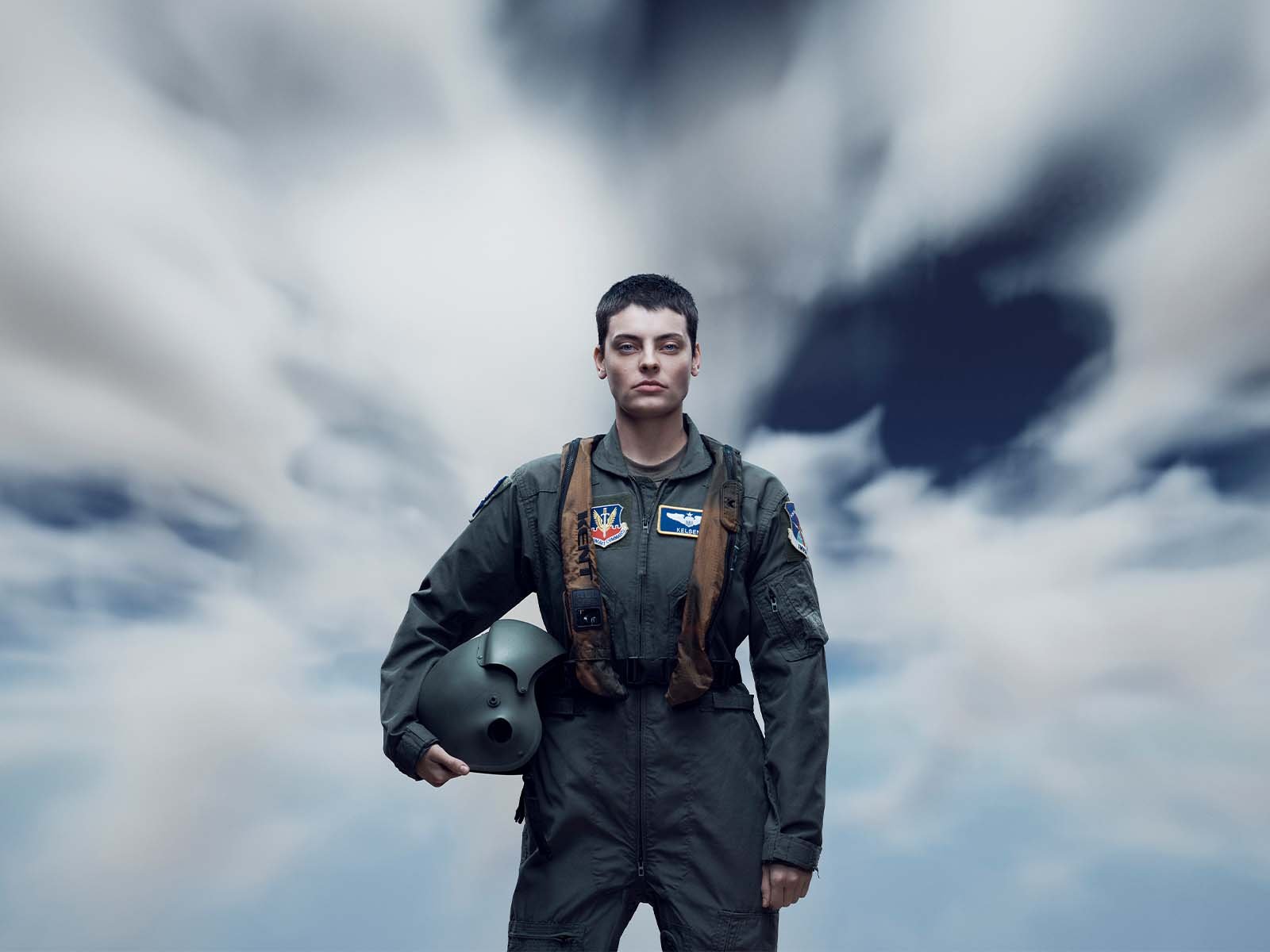Met Opera 2023-24 Review: Florencia en el Amazonas
Ailyn Pérez and the Lotuses in Florencia en el Amazonas (Ken Howard/Met Opera)
Move over, Falstaff. The historic Met premiere of Daniel Catán’s Florencia en el Amazonas was unquestionably one of the most special, joyous, and yes, magical things I have ever seen, done, or experienced.
This is only the third opera in Spanish the Met has ever done, and the first opera by a Latino composer. Sadly, the Mexican Jewish Catán died too young to see his most famous opera at the Met, but this proud Latina wouldn’t have missed it for the world.
Catán’s evocative music is meltingly melodic, and the absence of hummable tunes takes nothing away from the score’s cinematic portrait of nature and plentiful lyricism, which was a lovely break from the aimless dissonance of most modern music. Surprise: another contemporary opera I like love.
Just before conductor Yannick Nézet-Séguin gave the downbeat, an audience member hollered, “¡Viva la ópera en español!” Long live opera in Spanish! The crowd and I thunderously shouted our approval, in the first sign of the vivacious energy that permeated the evening.
Funnily enough, the instrumentation of the 20-second overture reminded me of another fantastic voyage, but the resemblance to the 1966 sci-fi film was brief and the curtain quickly rose to reveal vendors hawking their goods — “¡Jarabe! … ¡Compre usted este caimán! … ¡Grosellas!” — in a scene reminiscent of the famous opening of Act 2 of La Bohème: “Aranci! Datteri! Caldi i marroni!”
Mattia Olivieri (in gold) in Florencia en el Amazonas (Ken Howard/Met Opera)
The first character to be introduced was Ríolobo, confidently sung by Mattia Olivieri in his debut. Ríolobo, whose name translates to “river wolf,” is a “criatura de este río” (creature of this river), and Olivieri had an intriguing, otherly presence as he introduced the other characters: the writer Rosalba (Gabriella Reyes) and the feuding couple Paula and Álvaro (Nancy Fabiola Herrera and Michael Chioldi). I chuckled at an inside joke for Latinos: Paula asks Álvaro “¿si o no?” and the answer touches the trademark Mexican “si, pero no.”
Olivieri’s Ríolobo underwent a brief metamorphosis during the storm at the end of Act 2, imploring the river gods, “¡No destruyan el mundo! ¡Piedad, piedad!” (Do not destroy the world! Mercy, mercy!) Let’s reshare the video on Earth Day going forward. The act ended on a cliffhanger: the four remaining passengers (Florencia, Arcadio, Rosalba, and Paula; Álvaro had been swept overboard) clinging to the helm, crying out “¡Estamos a la deriva!” (We’re adrift!) Then the lights went out.
Ailyn Pérez in Florencia en el Amazonas (Ken Howard/Met Opera)
Trains wait for no one, but boats wait for Ailyn Pérez. She made her entrance running to catch El Dorado before it cast off. True to my hopes, the audience burst into applause. Ailyn dashed offstage without singing a note, which made it all the more memorable. When she did begin singing aboard the boat, she snatched my breath away with Florencia’s spellbinding rumination on her life, romance, and career. Ailyn’s luxurious voice is like a warm hug, while never losing the salero (verve, moxie) without which Latin music loses its Latinidad. (Please take note: her surname is pronounced PEH-res, as the accent on the first e indicates. It is not puh-REZ, as most seem to think.)
Gabriella Reyes is the first singer of Nicaraguan descent to sing at the Met, and she did Nicaragua proud. Her vibrant voice filled the house like cream in a profiterole, and she poignantly portrayed Rosalba’s journey from rejecting love to embracing it. Her duet with Ailyn was a real treat; it was as if the two sopranos energized and lifted each other to the treetops of the Amazon.
Gabriella Reyes and Mario Chang in Florencia en el Amazonas (Ken Howard/Met Opera)
Gabriella’s most frequent scene companion, however, was Mario Chang as Arcadio, the Captain’s nephew, aspiring pilot, and Rosalba’s love interest. Their partnership goes all the way back to Gabriella’s 2019 Santa Fe debut, and they were clearly at ease together, making the love story that much more credible. Not that it needed much help; Chang was very dramatically effective, and even without binoculars, Arcadio’s emotions carried to the top levels of the house.
Nancy and Chioldi made an absorbing duo as the bickering spouses that throw away their rings only to be brought together by the tragic loss and magical return of Álvaro. Because Chioldi did not go over the mobile railings separating the ship and river, it was difficult to tell that he had fallen overboard. Still, the image of him being swept away by dancers in swirly blue costumes was striking.
From left: Nancy Fabiola Herrera, Mattia Olivieri (second from right), and Michael Chioldi in Florencia en el Amazonas (Ken Howard/Met Opera)
Nancy, born in Venezuela to Spanish parents, has been gifting her mature, balanced voice to the Met since 2005 and created the role of Donna Rosa in Catán’s last opera, Il Postino. On the other hand, Chioldi debuted back in 1996 — the same year as Florencia’s premiere — but only broke through here last year, when he stepped in for an ill Quinn Kelsey in Rigoletto. Despite their differing rises, their beautiful chemistry was scene-stealing, particularly during the couple’s heartwarming reconciliation.
Ailyn’s exit was as indelible as her entrance: as she slowly walks offstage, cerulean wings pop up from her gown, transforming Florencia into a butterfly. When you’re having fun, time flies even faster than butterflies, so curtain call came before I knew it. I had a happy lump in my throat, but I’ve had that before with Aida and the Chorus of the Hebrew Slaves in Nabucco, so I didn’t think much of it. I was planning to give a standing ovation to the whole work in any case, but I got to my feet for Gabriella Reyes (I would have jumped up if my dress would have allowed). After Mattia Olivieri, it was Ailyn’s turn. The audience absolutely screamed for her.
Ailyn knelt on the stage and put her hand on her heart, and I smiled at the realization that my first-ever happy tears were falling. There I was, grinning from ear to ear, laughing, and sobbing at the same time. I couldn’t stop. A friend at the Met told me that she could hear me “screaming on the monitor.” I’m glad!
¡Viva la ópera en español!








